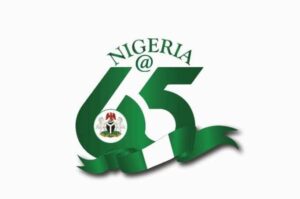
By The Merit Newspaper’s Editor
When Nigeria’s green-and-white flag first replaced the Union Jack on October 1, 1960, the air was optimistic. The new nation, endowed with oil reserves, fertile land, and the largest population in Africa, was expected to chart a path to prosperity and global influence. Sixty-five years later, Nigeria still inspires hope but embodies the frustrations of a country where economic growth and infrastructure development have often failed to match expectations.
Six and a Half Decades of Independence
Nigeria’s journey since independence has been a mix of progress and setbacks. The early post-colonial years were marked by the building of institutions and a push for national unity, quickly interrupted by the civil war (1967–1970). The oil boom of the 1970s swelled government coffers and raised expectations, but much of that wealth was mismanaged, with corruption and poor planning leaving infrastructure in disrepair.
The return to democratic rule in 1999 marked the beginning of the Fourth Republic, restoring hope that the country could finally build stable governance. In many respects, democracy has delivered: Nigeria now boasts a vibrant press, an outspoken civil society, and globally celebrated sectors such as Nollywood and Afrobeats. Yet, these successes stand alongside persistent economic hardship, decaying roads, epileptic electricity supply, and widening inequality.
Economic Growth on Paper, Struggles on the Street
Statistically, Nigeria looks impressive. A recent rebasing of the economy increased GDP by about 30 per cent, vaulting Nigeria higher on global rankings. In 2025, growth picked up after difficult reforms, with oil production recovering and the service sector surging.
But for many Nigerians, this “growth” feels abstract. “The GDP looks healthier, but I don’t see it,” says Chinyere, a teacher in Port Harcourt. “My children still fetch water from a borehole, and the road to our community floods every year.”
Her frustration reflects a larger paradox: while Nigeria’s economy is expanding on paper, inflation, unemployment, and poverty still bite hard. A shop owner in Lagos, Adamu, puts it bluntly: “I spend half of my profit on diesel to run a generator. Without power, how can small businesses survive?”
The Democratic Era: Gains and Gaps Since 1999
Democracy has unlocked entrepreneurial energy. Mobile phones and internet access transformed communication and created millions of jobs. Lagos is now a hub for fintech startups attracting global investors. Nigerian music and film dominate African culture and increasingly reach global audiences.
But this vibrancy has not solved structural problems. Unemployment remains high, especially among young people. Public education and healthcare suffer from chronic underfunding. Many Nigerians say that corruption still drains resources that could build roads, hospitals, and a reliable power supply.
“We’ve seen amazing tech startups and creative exports,” says Tola, a young entrepreneur in Lagos. “But these sectors don’t create enough jobs for the millions of graduates entering the market every year.”
Infrastructure: A Work in Progress
Nigeria’s infrastructure story explains much of its development challenge:
Power: Despite new investments, electricity remains unreliable. Frequent blackouts force businesses and households to depend on costly generators.
Transport: Congested urban roads, poor inter-state highways, and an underdeveloped rail system limit productivity and drive up costs.
Ports: Efforts to modernise Lagos and Port Harcourt ports have improved efficiency, but logistics bottlenecks remain.
Digital: A rare bright spot, with internet penetration and mobile money reshaping business and daily life.
READ ALSO:Nigeria’s Interest Rate Slash: Growth Stimulus or Gamble?
The Human Development Paradox
Nigeria is Africa’s most populous nation, but millions still live in poverty. The UN Human Development Index continues to place Nigeria in the “low” category. Education quality is uneven, maternal health indicators lag, and child malnutrition is widespread.
“The reforms may be necessary,” explains an Abuja-based economist, “but without safety nets, they punish the poor. Economic statistics won’t matter if families cannot afford food, healthcare, or education.”
READ ALSO:Otun Baale of Olowofela, Hon. Akingbala, Felicitates Oba Akamo on Birthday Anniversary
Why Nigeria Matters Globally
Nigeria’s story is not just a domestic concern. With more than 220 million people, its successes and failures ripple across Africa and beyond. Nigeria’s oil and gas feed international markets, its cultural exports shape global entertainment, and its stability influences migration, security, and trade across West Africa.
For international observers, Nigeria at 65 remains a paradox: a country bursting with potential, blessed with human and natural resources, yet still struggling to deliver reliable governance and infrastructure for its people.
Looking Ahead: What Must Change
As Nigeria marks 65 years of independence, experts and citizens alike say the priorities are clear:
1. Provide safety nets for the poor as tough reforms take effect.
2. Fix power and transport, the lifeblood of industrialisation.
3. Fight corruption with transparency, ensuring that public funds translate into real projects.
4. Create jobs by linking growth in technology and entertainment to broader employment opportunities.
5. Invest in education and skills to prepare a young population for the future.
Hope Against the Odds
Nigeria at 65 is both a success story and a cautionary tale. The nation has survived civil war, military dictatorship, economic shocks, and political instability. It has also given the world groundbreaking music, vibrant entrepreneurship, and remarkable resilience.
Yet, the daily struggles of ordinary Nigerians tell a different story — one of roads that remain impassable, power grids that go dark, and reforms that weigh heavily on the poor.
READ ALSO:Ambassador Odunayo Hails Olu of Itori on Birthday
The question facing Nigeria today is the same one it faced at independence: how to turn immense potential into shared prosperity. At 65, the world is still watching, and Nigerians are still waiting.

















